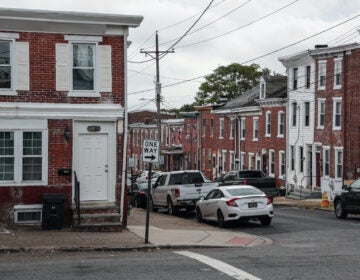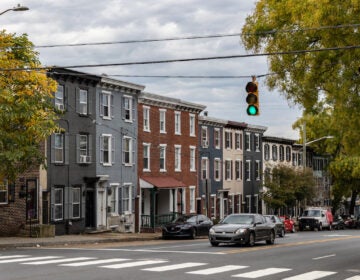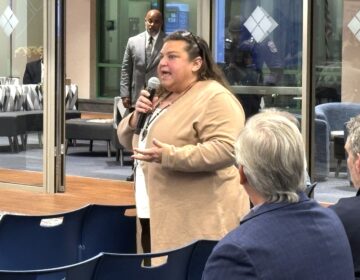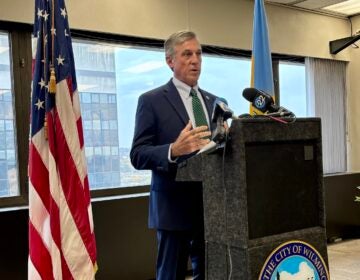‘100% due to the public’: Wilmington City Council rejects mayor’s quest to end residency rule for city employees
Mayor Purzycki thought he had the votes to eliminate a law that’s been on the books for decades. Instead, a vocal public forced City Council to reaffirm the law.
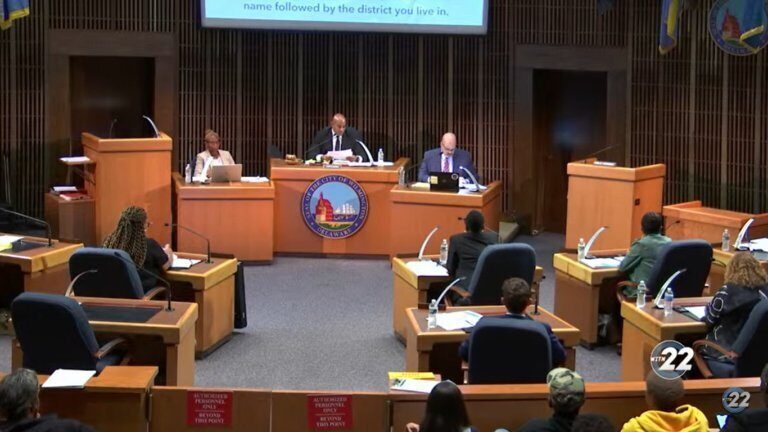
City Council had been poised to overturn the residency rule in Wilmington, but vocal opposition by residents ultimately led members to reaffirm the law. (City of Wilmington)
From Philly and the Pa. suburbs to South Jersey and Delaware, what would you like WHYY News to cover? Let us know!
Wilmington Mayor Mike Purzycki and his administration have spent nearly the last two years waging a dogged war to eliminate or at least water down the city’s residency requirement.
The quest turned somewhat bizarre in recent weeks, but appears to have ended with the mayor quietly absorbing a bruising, public defeat.
It’s been a long tussle over the law that since the late 1990s has required employees of the Wilmington government to live in the city for five years. Outsiders get six months to move into town, according to the city code.
First, Purzycki’s team persuaded state lawmakers to give the city the authority to change the law.
Then the administration convinced City Council President Trippi Congo to introduce a bill to eliminate the statue that the mayor contends has prevented the city from filling dozens of jobs for police officers and other critical employees such as traffic engineers and lawyers. Congo’s bill first exempted only appointed officials from the residency rule but later was amended to include all employees.
The bill languished, however, and Congo stopped advancing it after proponents of requiring residency began pushing back. Advocates say residency laws, common in the region for bigger municipalities, ensure that employees, especially police officers who protect residents, have a greater stake in the city’s economic and social livelihood.
Congo’s lack of action didn’t stop Purzycki, whose administration declared in October that the city was no longer enforcing the “former’’ residency requirement, even though council had not eliminated anything and it remained on the books.
Councilman Al Mills had picked up the legislation that Congo abandoned, and thought he had the votes to get it passed by the 13-member council in mid-October.
But Purzycki, who days earlier had announced he would not seek a third term in 2024, and Mills had miscalculated. More than 75 supporters of a residency law packed council chambers downtown, many speaking forcefully for it. After listening for four hours, Mills decided to hold his bill.
Since that night, other efforts surfaced in council to water down the residency law. One measure would have required that Wilmington employees live within three miles of city limits. Another expanded the residency area to include all of New Castle County. Both ideas were voted down in a council committee.
Finally, last week, a bill sponsored by Councilwoman Shané Darby reaffirmed the current five-year requirement, though it did amend the law by giving new employees a full year to move into the city.
After yet another meeting packed with supporters for the residency requirement, Darby’s measure passed in an eight to one vote with three abstensions. One member was absent. Bills require seven “yes” votes to become law.
The bill also creates a residency assistance fund to help new employees with security deposits, down payments, signing bonuses, and relocation fees. The amount of the fund will be decided during the city’s annual budget process.
Purzycki, who raised the ante himself more than a month ago by publicly proclaiming that the rule was no longer in effect, has been unusually quiet on the issue. His chief spokesperson, John Rago, has not responded to several requests for comment then, and that silence continued this week.
Congo said City Council’s upholding of the residency rule shows the power of residents voicing their opinions publicly. Several speakers at the recent council sessions have told members that if they vote against residency, they will have targets on their backs in the 2024 election.
“I think the public made a huge difference,” the council president said. “There are several council members who were dead set, honestly, on voting for no residency. But I think that the way the public turned out and some of the things that they were saying just resonated with some council members and they were able to change their minds. I think this was 100% due to the public.”
Purzycki still has until Monday, Nov. 27, to issue a veto, a move which would require a vote of nine council members to overturn. If he doesn’t veto, the new requirement with a one-year grace period to move into the city will be the law.
Congo said he doubts the mayor will keep fighting the issue, and Darby said she suspects Purzycki will let it become law without his signature.
Darby, a first-term member of council who was instrumental in organizing residents to descend on council chambers and voice their opinions, said the amended law that passed last week bill gives the administration more tools to persuade people to take jobs and live in a city that they keep touting as a great place to live.
“We’re a city trying to be rebuilt and we think about what’s happening at the riverfront and downtown with hundreds of new apartments being built,’’ Darby said. “We also think about the other residential areas that need that thriving community. There’s a lot of vacant homes here. There’s crime. So getting people to stay here with well-to-do or very well-to-do income will benefit our city.”

Get daily updates from WHYY News!
WHYY is your source for fact-based, in-depth journalism and information. As a nonprofit organization, we rely on financial support from readers like you. Please give today.



